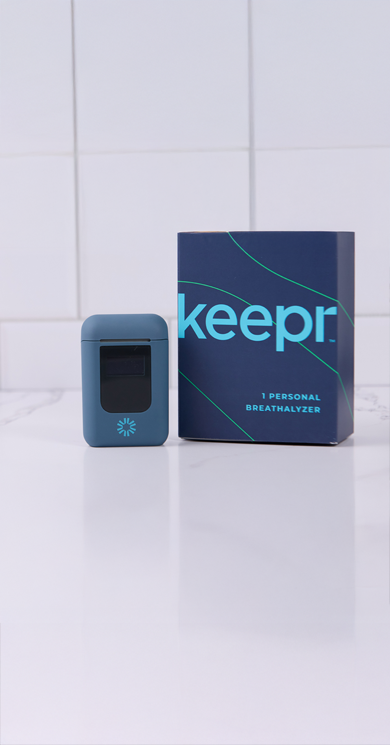
Alcohol use disorder (AUD) can deeply impact families and custody decisions.
6 min read
Written by Brian Davis LISW-S, SAP
Navigating Family Law: Achieving Favorable Outcomes When Alcohol Use Disorder Is Involved
A guide to understanding how AUD is addressed in the legal system and why a personal breathalyzer can help support healthy families.
Key Takeaways
- Alcohol use disorder (AUD) is a medical diagnosis.
- Courts may use a predetermined framework to determine alcohol use disorder risk levels.
- Courts may proactively monitor cases involving high-risk alcohol use, even when a genuine AUD diagnosis is difficult to determine.
Alcohol use disorder (AUD) is a complex, often misunderstood condition that can have profound effects on families, especially when legal decisions about custody, visitation, or guardianship are at stake. While much of the guidance around AUD in family law is written for judges, anyone interested in family law, from parents and advocates to attorneys and concerned family members, can benefit from understanding how AUD is addressed in the legal system and what steps can be taken to support safe, healthy family outcomes.
Whether you are navigating a custody dispute, supporting a loved one, or simply want to understand how courts approach these sensitive issues, this guide will help you advocate for the best interests of children and families and inform you about alcohol monitoring solutions like Keepr®.
While I am a Licensed Independent Social Worker and a Substance Abuse Professional, this blog is for informational purposes only and does not constitute medical or legal advice. If you have questions about how a personal breathalyzer works, speak to a Keepr specialist now.
Understanding Alcohol Use Disorder in the Family Law Context
Alcohol use disorder is a chronic, relapsing brain-based disease characterized by continued use of alcohol despite significant harmful consequences. It disrupts the brain’s reward system, leading to powerful cravings and making alcohol more pleasurable than other experiences, such as relationships or food. This can result in significant dysfunction in psychological, social, and biological functioning.
In family law, AUD is considered a medical diagnosis and is a factor that can impact parenting ability, child safety, and the stability of family relationships. Courts must balance the need to protect children with the goal of maintaining healthy family connections whenever possible.
Why AUD Is Challenging in Family Law
- Alcohol is legal and socially accepted. This makes it difficult to distinguish between casual use, misuse, and a diagnosable disorder.
- Evidence is hard to obtain. Proving problematic alcohol use in court often requires more than personal observations; it may involve expert testimony, monitoring, or medical records.
- Diagnostic criteria are difficult to determine. Some parents may be in early stages of AUD, have just enough control, be “high-functioning,” or cautious enough to avoid being clinically diagnosed. This high risk or borderline use of alcohol may not meet diagnostic criteria but still puts children at risk.
- Stigma and myths persist. Misconceptions about AUD can influence how families, professionals, and even judges perceive the risks and solutions.
Key Considerations for Favorable Family Law Outcomes
-
Recognize the Signs and Impact of AUD
- Symptoms of AUD include using larger amounts of alcohol over time, unsuccessful attempts to cut down, strong urges to drink, withdrawal symptoms, and neglecting responsibilities due to drinking.
- Impact on families can range from emotional distress to parenting while impaired, financial instability, and increased risk of harm to children.
-
Gather Objective Evidence
- Monitoring and testing: Reliable alcohol monitoring systems such as Keepr can provide proof of sobriety, helping to clarify allegations and support recovery.
- Documentation: Keep records of incidents, treatment participation, and any relevant communications.
-
Understand the Risk Assessment Process
Courts often use a risk chart or framework to determine the level of risk a parent’s alcohol use poses to a child. Factors considered include:
- Frequency and quantity of alcohol use
- History of relapses or treatment attempts
- Impact on parenting time and child safety
- Presence of a sober caregiver during parenting time
Determining Alcohol Use Disorder Risk Levels
Risk levels are typically categorized as low, medium, or high, with corresponding recommendations:
Risk Typical Recommendations Low Monitoring, education, support Medium Outpatient treatment, increased monitoring High Medical detoxification, supervised visitation, possible temporary loss of custody
- Promote Recovery and Family Stability
-
- Treatment and support: Encourage participation in treatment programs and support groups. Recovery is often a long-term process with relapses and remissions.
- Parenting plans: Tailor agreements to address specific risks, such as requiring sobriety during parenting time or including a “sobriety clause” in custody agreements.
- Communication: Foster open, honest dialogue between co-parents, professionals, and the court.
Practical Steps for Families and Advocates
If you suspect that a family member’s alcohol use is impacting their ability to parent, act early and seek help as soon as possible. Taking prompt action can prevent the situation from escalating and help children stay safe.
A personal breathalyzer allows families to conduct reliable and real-time alcohol testing in a user-friendly and non-invasive way. These remote alcohol monitoring devices like Keepr facilitate sobriety efforts by delivering verifiable breath alcohol concentration (BrAC) results.
Work with professionals such as attorneys, therapists, and addiction specialists to help you gather evidence, create safety plans, and advocate effectively for the right interventions. Throughout the process, always keep the child’s best interests at the center of your efforts.
Courts prioritize child safety and well-being, but they also recognize how important it is to maintain family connections whenever possible. By being proactive and focusing on both safety and support, you can make a meaningful difference in your family’s life.
Affordable Remote Alcohol Monitoring is Possible
Proving sobriety with remote alcohol monitoring historically places additional strain on families already experiencing financial and emotional challenges. These challenges limit participation and increase non-compliance in family court cases.
With affordable pricing and the lowest monthly subscription among top solutions, Keepr eases the financial burden on both parents and the court system, making participation more accessible and supporting healthier co-parenting.
By making it easier for parents to demonstrate sobriety, Keepr helps courts uphold child safety and family transparency while reducing the friction commonly associated with compliance.
Frequently Asked Questions About AUD
Q: What is alcohol use disorder, and how is it diagnosed?
A: AUD is a chronic brain disease marked by problematic alcohol use that causes significant distress or impairment. Diagnosis is based on criteria such as inability to control drinking, cravings, withdrawal, and continued use despite harm.
Q: How does AUD affect family law cases?
A: AUD can impact custody, visitation, and guardianship decisions. Courts assess the risk to children and may require monitoring, treatment, or supervised visitation to ensure safety.
Q: What evidence is needed to prove AUD in court?
A: Proving AUD requires a clinical diagnosis from a licensed clinician. Not all instances of alcohol misuse will result in a clinical diagnosis. Alcohol monitoring reports, medical records, and expert testimony can help the court determine whether a parent’s alcohol use is impacting child safety.
Q: Can a parent with AUD regain custody or visitation rights?
A: Yes, with documented recovery efforts, compliance with treatment, and evidence of sobriety through tools like Keepr, parents can often regain or expand parenting time. Each case is unique and depends on demonstrated progress and child safety.
Prove Sobriety with Keepr
Alcohol use disorder presents unique challenges in family law, but with the right knowledge and approach, families and advocates can work toward outcomes that prioritize both safety and healthy relationships. By understanding the realities of AUD, gathering objective evidence, and supporting recovery, it is possible to navigate the legal system effectively and achieve the best possible results for children and families.
If you are interested in speaking with a Keepr specialist, give us a call at 833-743-5969 or send us a message. Keepr's alcohol monitoring solution is affordable and available for purchase.
External Sources
More posts
Find the Keepr that's right for you
Flexible subscription options for solutions tailored to your unique needs.
Shop Now




